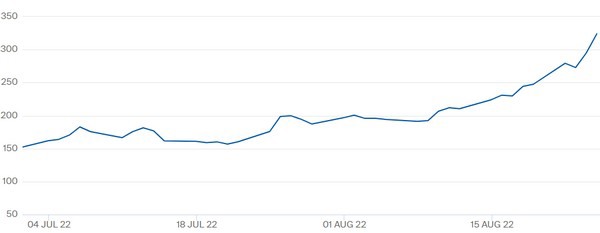On Thursday, August 25, the TTF gas prices shot through the 300 €/MWh mark. This is another extraordinary price record on this important, heavily overheated European gas trading exchange. In this crisis update, we list last week's energy developments, and specialists consider the whole (another bizarre) energy week.

The gas prices for 'winter 2022' until August 25 on the Title Transfer Facility. On Thursday, the price, also for 2023's first quarter, shot through the 300 €/MWh mark. On Friday mid-morning, it remained at roughly the same level. See the current figures here.
Specialisten from AgroEnergy run through the energy developments in their weekly updates. They note that in addition to the Russian troubles, Norway's increasing maintenance of the gas infrastructure is making the market 'unusually agitated'. Maintenance is scheduled for NordStream 1 too. Starting August 31, that gas pipeline will be closed for three days, says Russian state gas company Gazprom. The market doubts supply will return to the level after that (read 20% of maximum capacity).
Norway will step up maintenance in the coming weeks. According to AgroEnergy, Norwegian grid operator Gasco reports that planned maintenance will peak on September 7. Plus, LNG delivery is delayed after a fire at a facility in the US.
Gas prices are set to rise by 30% more than last week across the board until the 2025 year block. Compared to the beginning of this month, forward prices for year blocks 2024 and 2025 have now doubled; for 2026, the price is +50% (from 44 to 67 €ct/m3). The actual long term is thus now also participating in market prices that are far from cost prices, the AgroEnergy specialists observe.
Electricity forward prices, too, have risen sharply. The baseload price for the coming winter is estimated to be around 750 €/MWh. That baseload should be roughly 550 €/MWh this week. You can read AgroEnergy's complete update here.
Vandaag opnieuw een record NL elektriciteitsprijs: gemiddeld 693,83 €/MWh. Ongeveer 20x (!) normaal op een vrijdag in de zomer.
— Martien Visser (@BM_Visser) August 26, 2022
Het leidt tot een enorme transfer van welvaart van consumenten naar, ..., naar wie eigenlijk?
Data: https://t.co/tyQgL1d4PF pic.twitter.com/CnEJ4ODCge
Today, another NL electricity price record: average 693,83 €/MWh. About 20x (!) the normal on a Friday in the summer. That leads to a massive transfer of wealth from consumers to... who really knows? Data: https://t.co/tyQgL1d4PF pic.twitter.com/CnEJ4ODCge. - Martien Visser (@BM_Visser) August 26, 2022
In Germany, too, electricity prices are trailing gas prices.
German power prices continue to be pegged to gas prices pic.twitter.com/Zvd0PQJDRt
— Lion Hirth (@LionHirth) August 25, 2022
At 11 am on Friday, the Dutch government had not yet released an update about filling the country's gas storage facilities. You can find that weekly update here.
Stop or continue? Many Dutch greenhouse cultivation companies currently face that dilemma. Dutch regional broadcaster, Omroep West spoke to Juliska van der Breggen, a chrsyantenum grower and tomato farmer, Richard Hartensveld of Schenkeveld Tomaten. Juliska is stopping production in one of the two greenhouses.
But Richard will continue, with an adjusted cultivation strategy, in all eight greenhouses. There will not be production in the winter, which means a far lower turnover. You can read the whole Omroep West article (in Dutch) here.
In a post on Foodlog, Dick Veerman writes about an interesting experiment happening in horticulture. A return to seasonal products - the basis of horticulture - but using modern know-how and techniques. You can read about it (in Dutch) here.
It is not only greenhouse growers that are reducing their production. So is Norwegian fertilizer manufacturer Yara. On Friday, August 26, it shut down a second of its three ammonia plants. Yara wants to import ammonia, which is cheaper than making it itself, reports another Dutch regional broadcaster Omroep Zeeland.
